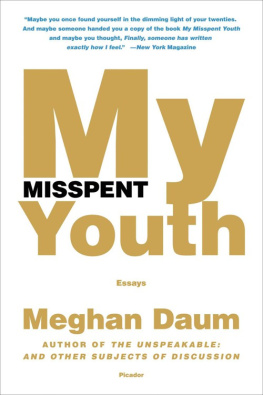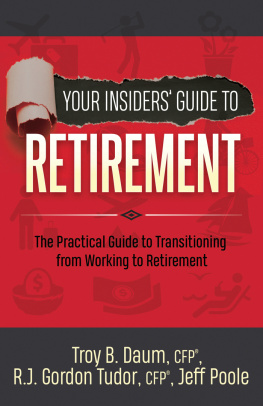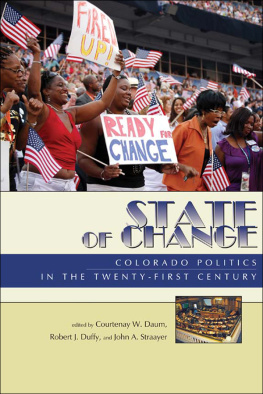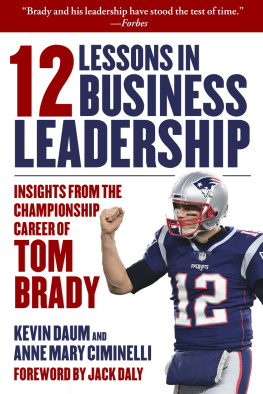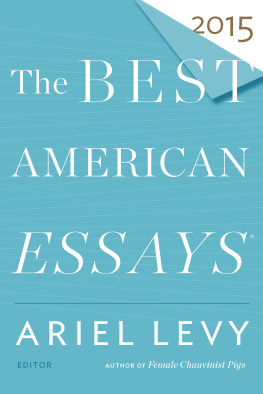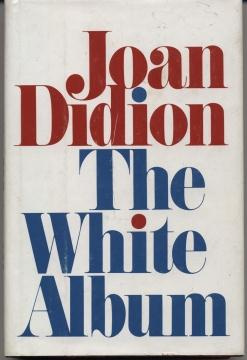The Unspeakable And Other Subjects of Discussion
Life Would Be Perfect If I Lived in that House
The Quality of Life Report
As Editor
Selfish, Shallow, and Self-Absorbed: Sixteen Writers on the Decision Not to Have Kids
[In these] sublime musings on modern life, Daum caustically and amusingly tackles the pitfalls of cyber-dating, the humiliations of genteel poverty, and the roots of terror of baby dolls, among other subjects. A self-proclaimed curmudgeon, Daum clearly doesnt suffer fools gladly, but shes compassionate; theres a big heart under all the armor.
Us Weekly
These essays delve into the corners of contemporary life, ferreting out the eccentric as well as the ordinary. Daums is a provocative and refreshing new voice.
Library Journal
A talented prose stylist, she can penetrate the shiny crust of the genre essay and come up with unexpected ideas.
Salon
[Daum writes] bravely and with heart Hilarious, lyrical
The Village Voice
For several years now, Ive kept copies of some of these essays in a manila folder by my desk. When friends or colleagues ask if I know of any especially interesting new writers, I pull out the folder and head for the photocopier. Meghan Daums essay Variations on Grief is one of the most stunningly honest things Ive ever read. And throughout this book, there are a surprising number of moments when your jaw just drops in amazement at what shes saying. Even when shes being funny, her writing has a clarity and intensity that just makes you feel awake.
Ira Glass, host of This American Life
A voice that is fresh and wickedly funny, bracing in its honesty.
Bruce Jay Friedman
For a collection this smart, assured, and unpredictable, Daum should get time off in purgatory and a start-up grant on her next incarnation as well She is never less than original in her observations, and never less than honest in her self-examination. Brave words from a brave writer.
Flaunt
A Joan Didion for the new millennium, Meghan Daum brings grace, wit, and insight to contemporary life, love, manners, and money. Her misspent youth is a readers delight.
Dan Wakefield, author of New York in the Fifties
Meghan Daum has the true essayists gift: she will say what no one else is willing to say (about being a shiksa, about leaving New York, about being unable to grieve), and through her eloquent and vivid candor she embodies for the reader nothing less than what it feels like to be alive in America right now.
David Shields
Meghan Daum articulates the only secret left in the culture: discreet but powerful fantasies of romance, elegance, and ease that survive in our uncomfortable world of striving. These essays are very smart and very witty and just heartbreaking enough to be deeply pleasurable.
Marcelle Clements

The author and publisher have provided this e-book to you for your personal use only. You may not make this e-book publicly available in any way. Copyright infringement is against the law. If you believe the copy of this e-book you are reading infringes on the authors copyright, please notify the publisher at: us.macmillanusa.com/piracy.
T ABLE OF C ONTENTS
This book has a theme. It has, despite appearances to the contrary, a point, one which is made somewhere in each essay and, with any luck, emerges at the end of the book as a subject, albeit an elusive and abstract subjectnothing that will be turned into a major motion picture starring Julia Roberts, although I suppose theres always hope for a Wallace Shawn vehicle, a one-man, experimental meditation on the psychodynamics of e-mail, air travel, floor coverings, sex, death, and various other cultural anxieties that surrounded bourgeois, urban life at the very end of the twentieth century. I have been told repeatedly that stringing these concepts together would be a bad idea, that I should, instead, focus on a more coherent topic, such as spirituality, dating, new media, womens gymnastics, or, as was suggested by a member of the New York publishing community who called me up one day with a surefire book ideamadness.
This book is not about any of those things. If anything, this book is about not knowing what things are about and trying to sort matters out by using ones personal experiences and observations as a tool. Recently I was going through my files and ran across some notes Id taken during a conversation with a magazine editor about what Id promised would be no less than an eight-thousand-word treatise on the sociopolitical impact of R.E.M. videos on those who were born between 1965 and 1978. The advice from the editor seemed, more than anything, to encapsulate what this book is about.
stay speaking from experience,
the word aesthetic is a turn-off,
idea that generation has been paralyzed by irony has been said, so argumnt [ sic ] must be couched in terms of own experiece [ sic ],
true that people define themselves according to trappings rather than actual things? is this new? maybe its just you
The reason I never managed to complete an eight-thousand-word treatise on the sociopolitical impact of R.E.M. videos on those who were born between 1965 and 1978 was that I could not get through one paragraph without using aesthetic at least five times. The word may be a turn-off, but I could never come up with any other way to describe the central conflict of my life and illustrate the condition that I feel most strongly affects the way we as humans go about the business of living our lives: our habit of expressing ourselves through the trappings of particular ideas rather than through the substance of those ideas. (Sexy topic! Lets green-light it.)
Those notes date back to a few years ago, when I was frequently asked by glossy print publications to write think pieces on matters concerning Generation Xwhy Generation X is afraid of sex, why Generation X doesnt go to Broadway plays, why certain members of Generation X undergo existential crises of such magnitude that they are driven to bungee jump from bridges in New Zealand. These requests come up less frequently these days, either because I proved myself incapable of succinctly tackling the subject or, more likely, because Generation X has aged beyond the target audience for Nike and Coke and there are fewer occasions around which to wrap over-generalizing articles filled with phrases like More and more and Were living in a time of
Just to clarify things, the R.E.M. idea had to do with a particular ambiance in the pop culture that, in the early- to mid-1990s, was supposed to convey realness. I called it the R.E.M. aesthetic. But its largely moot now, because this aura is no longer used to sell Nikes and Coke. Judging from the commercials during the last Super Bowl, the next generation is clearly operating under a new aesthetic, and Ill leave it to the next overreaching young writer to unpack the semiotics of Britney Spears or N Sync, which I can only pray are dated by the time anyone reads this.
As for the rest of the pieces in this book, none of which bear any direct relationship to R.E.M. or Generation X (that term will not appear again in these pages), they are all about the way intense life experiences take on the qualities of scenes from movies. They are about remoteness. They are about missing the point. They are about the fictional narratives that overpower the actual events, the cartoon personae that elbow the live figure out of the frame. They are about the romantic notions that screw up real life while were not looking.
These pieces are not confessions. Theyre about me but theyre also about a lot of other things, and a few of the stories I tell never even happened. I am not a person who keeps a journal. Instead, Im inclined to catalog my experiences and turn them over in my head until some kind of theme emerges and I feel I can link the personal banalities to something larger and worth telling. This may be the reason I often have difficulty remembering events as they actually happened. No doubt it is a symptom of my aforementioned point, which concerns the tendency of contemporary human beings to live not actual lives but simulations of lives, loving not actual people but the general idea of those people, operating at several degrees of remove from what might be considered authentic if we werent trying so hard to create authenticity through songs and clothes and advertisements and a million other agents of realness. In other words, this book is about a world ruled by accessories, about a citizenry that expresses its tastes, its politics, its dreams, and its heartbreaks via the trinkets on its shelves. But maybe thats just me.
Next page
